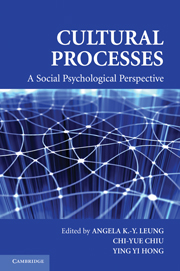Book contents
- Frontmatter
- Contents
- Figures and Tables
- Contributors
- Preface
- Part One Introduction
- Part Two Representational theories of culture
- Part Three Psychological functions of culture
- Part Four Manifestations of cultural processes
- Part Five Transcultural processes
- 12 Bicultural Identity Negotiation
- 13 Multicultural Experiences and Intercultural Communication
- 14 Multicultural Experience Fosters Creative Conceptual Expansion
- 15 Workforce Diversity and Creativity: A Multilevel Analysis
- Index
- References
13 - Multicultural Experiences and Intercultural Communication
Published online by Cambridge University Press: 05 June 2012
- Frontmatter
- Contents
- Figures and Tables
- Contributors
- Preface
- Part One Introduction
- Part Two Representational theories of culture
- Part Three Psychological functions of culture
- Part Four Manifestations of cultural processes
- Part Five Transcultural processes
- 12 Bicultural Identity Negotiation
- 13 Multicultural Experiences and Intercultural Communication
- 14 Multicultural Experience Fosters Creative Conceptual Expansion
- 15 Workforce Diversity and Creativity: A Multilevel Analysis
- Index
- References
Summary
As mentioned in Part II of this volume, culture consists of shared knowledge in the forms of societal norms, lay beliefs, values, practices, and routines. Through participating in culture and engaging in communication with other cultural members, people grasp the shared reality in their culture and use it as behavioral guides both when they communicate with people in their culture and when they interact with people from a different culture. Not surprisingly, the role of communication in cultural processes has been extensively discussed in the research literature. In contrast, how cultural processes affect communication has been relatively unexplored, although there is ample research on cultural differences in communication processes.
The goal of this chapter is to fill this gap by focusing on how multicultural experiences may impact intercultural communication. Drawing on the cultural competence model proposed by Chiu and Hong (2006), we contend that effective intercultural communication requires nuanced understanding of cultural differences and discriminative application of cultural knowledge to guide interactions in different cultural contexts. We further contend that multicultural experiences confer opportunities for intercultural learning. Thus, individuals with rich, multicultural experiences are expected to possess nuanced knowledge of cultural differences and be able to use such knowledge discriminatively to guide interactions in changing cultural contexts. In this chapter, we will discuss these contentions and review the pertinent supporting evidence. Finally, we will discuss how cultural identification and need for cognitive closure may moderate the effects of multicultural experiences on intercultural learning and discriminative application of cultural knowledge. To provide the context for these discussions, in the next section, we will briefly review the role of communication and intercultural communication in cultural processes.
- Type
- Chapter
- Information
- Cultural ProcessesA Social Psychological Perspective, pp. 242 - 262Publisher: Cambridge University PressPrint publication year: 2010
References
Accessibility information
- 2
- Cited by

